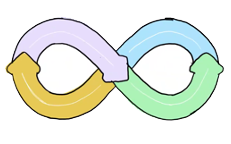Justin Balaski from IdeaLeap, shared the Lean Change Approach, an innovative methodology for managing change in organisations
He provided change managers with actionable insights and tools to implement lean change processes, moving away from traditional, linear models. Justin’s approach is grounded in continuous feedback, co-creation, and a bias toward action, all aimed at facilitating more effective change management.
Three Big Ideas
Lean change is a Feedback Driven Approach to Change
It combines the best of different change management philosophies to create a feedback-driven, action-oriented approach. This method helps you stay focused on delivering value while continuously improving your processes. It is fluid and dynamic. Change work, by nature, IS reactionary because it involves people and systems of people are complex and chaotic.
Core Elements of a Minimum Viable Change Process
Learn how to strip away unnecessary complexities and develop a streamlined process tailored to your organisation’s needs. This not only saves time but also increases the effectiveness of your change initiatives.
Building Your Own Minimum Viable Change Process (MVCP)
Get equipped with the knowledge to design their tailored change processes, focusing on practical and actionable steps.
Action Bias and Feedback-Driven Change

Traditional change models often involve extensive upfront planning, which can be counterproductive in complex and dynamic environments. Instead, he advocates for a model where action and feedback loops are central. This approach allows change managers to learn and adapt continuously.
Lean Change Cycle is a continuous loop of exploring, acting, and learning. This cycle is nonlinear and flexible, adapting to new information and feedback as it becomes available. By focusing on small, incremental actions and experiments, change managers can gather valuable feedback and make informed decisions.
Minimum Viable Change Process
This strips away unnecessary steps and concentrating on the most impactful actions. This process is designed to be lean and iterative, enabling change managers to respond quickly to feedback and evolving circumstances.
Key components of the MVCP include:
Strategic Change Canvas
These provide a high-level view of the change initiative, outlining the strategy in a lean and iterative manner. The change canvas serves as a living document, evolving as new insights and feedback are incorporated.
Change Kanban
A visual tool that replaces traditional work plans, the change Kanban board allows teams to see the flow of work, prioritize tasks, and ensure that efforts are aligned with strategic goals. It supports a pull-based system of work, enabling teams to adapt quickly to new information.
Big Visible Walls
These are central to maintaining transparency and alignment within the team. By visualizing the change process, teams can easily track progress, identify bottlenecks, and ensure everyone is on the same page.
Five Universal Changes
Justin introduced five universal patterns and anti-patterns that have proven effective in various contexts. These principles guide the Lean Change Approach and help ensure successful outcomes:
Cause and Purpose Over Urgency
Emphasising the underlying reasons and goals of the change is more effective than creating a sense of urgency. This approach helps stakeholders understand the value and importance of the change, fostering genuine engagement.
Meaningful Dialogue Over Broadcasting Information
Effective change management involves two-way communication. Rather than simply pushing information to stakeholders, meaningful dialogue allows for questions, feedback, and deeper understanding.
Experiments Over Executing Tasks
Treating change initiatives as experiments rather than a series of tasks encourages a focus on outcomes rather than outputs. This mindset shift helps teams learn and adapt more effectively.
Co-Creation Over Selling Change
Involving stakeholders in the change process from the beginning ensures their buy-in and support. Co-creation fosters a sense of ownership and aligns the change initiative with the needs and insights of those affected.
Response to Change Over Resistance Management
Viewing resistance as a response rather than a barrier helps change managers address underlying concerns and adapt their strategies. This approach encourages empathy and understanding, leading to more effective change implementation.
The Lean Change Approach is a powerful methodology for navigating the complexities of modern organisational change. By adopting its principles and tools, change managers can foster a more responsive, engaged, and successful change process, ultimately leading to better outcomes for their organisations and stakeholders.
Visit the member hub to access the full webinar and additional resources that will further empower your change management journey.
🎬 Members can watch the full webinar here 🔗 https://bit.ly/LCAI-hub
🤔 Not a member yet? Now is a great time to JOIN HERE NOW




